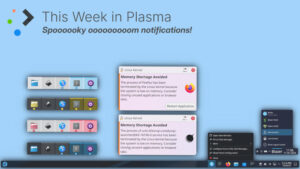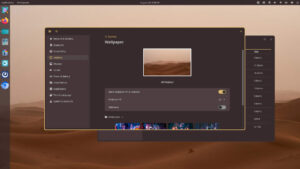No matter what anybody says there are numerous reasons why desktop Linux still doesn’t have traction. None of them have anything to do with the fact that there are a gazillion distos available.
Sure, it’s true that with the release of Vista there was a golden moment when desktop Linux could’ve flown high, but the fact that didn’t happen had nothing to do with users being confused over the number of operating systems carrying the Linux brand or with the developer base being spread too thin by this plethora of FOSS projects for any really good development to happen.
It’s all hogwash and more hogwash. The later contention is downright insulting as it implies that somehow GNU/Linux isn’t good enough. The first assertion, the confused consumer not knowing which distro to pick, is just plain wrong.
When was the last time masses of consumer computer users decided to migrate to a new operating system by installing one on a machine they already owned? I think “never” would be a pretty close to exact answer. Consumer computer users don’t install new operating systems, even on machines that’ve become obsolete by Microsoft standards but which could have new life with a Linux install.
As a general rule, consumers don’t even upgrade by way of the Windows upgrade path on their existing hard drive, unless it’s a service pack installed automatically by Microsoft. Consumer computer users upgrade by trading their old computer for a new one with an operating system already loaded.

Indeed, for the average consumer there was no option to choose from a gazillion distros. In fact, desktop Linux didn’t exist at all as far as Jane or Joe Schmo was concerned. Neither Best Buy, Circuit City (I think they were still around then), Federated or any of the other electronic retailers were offering Linux boxes in any meaningful way, simply because they weren’t available to them from the OEMs.
Linux wasn’t on the table because the big manufacturers didn’t want to confuse a consumer market they’d carefully trained to rely on Windows and Windows only. Unless, of course, you think that HP wasn’t pushing Linux because they were confused by the massive number of distros and just couldn’t decide which one would work well on the Pavilion. Five years ago the desktop market was still in a growth stage. HP, Dell and the others figured it easier to continue selling computers with XP or with the ability to roll back to XP, especially since consumers seemed to think that was a fine and dandy approach. Remember, XP was as popular as Vista was not.
| [yop_poll id=”20″] |
As for the argument that a gazillion distros means there’s not enough developers to go around… Let’s see, out of that gazillion, all but a handful are based on preexisting distros. Most of the little distros are being developed by just one person or a tiny group of developers, most of whom are doing it for love and wouldn’t work on a big project if you paid them. While it’s true that the folks at Ubuntu, Red Hat and SUSE don’t call me up on the phone every morning with a progress report, as far as I can tell, none of these giant-sized projects are experiencing a shortage of developer talent. From what I see, it’s just the opposite. Qualified folks are waiting in line for paying gigs with the commercial distros.
If you’ll notice, the OEMs are now starting to become serious about Linux as a marketable alternative to Windows 8, especially since it’s obvious that any changes Microsoft makes to their OS will not be enough to make it attractive or even palatable for desktop users. Redmond has their own agenda and that is to not lose the seemingly already lost mobile race.
The OEMs are falling all over themselves to come up with their own Chromebooks. Android just about owns the medium to low end tablet market and I have no doubt that soon you’re going to see players like HP and Dell work closely with developers at Canonical to create HP and Dell branded Ubuntu boxes.
All of this would seem to be obvious to me. Those who would claim that desktop Linux has failed to gain traction because of choice are only sowing FUD or trying to impress the gullible with their ability to go against mainstream thought–even if they’re dead wrong.
Christine Hall has been a journalist since 1971. In 2001, she began writing a weekly consumer computer column and started covering Linux and FOSS in 2002 after making the switch to GNU/Linux. Follow her on Twitter: @BrideOfLinux







I, for one never bought into that kind of thinking. I mean logically, variety is supposedly the “spice of life”, so why then would it be a crippling factor in the world of computers? if anything more distros give you more choices, and more choices mean more variety, which as the saying goes IS the spice of life! I have enjoyed using Linux for quite some time now, (started with Fedora 9 and never looked back!) In the interim I have installed and come to know quite a few distros, and while Fedora remains my Number One, I have my own favorites from other developers. I personally believe that those who use the “too many distros” argument are actually showing just how weakminded they are, for only someone who CANNOT decide or MAKE A DECISION on their OWN must have a weak mind!?….what say you?
@Eddie G. I say that if there weren’t a ton of distros I’d never have found Bodhi, which is my distro of choice at the moment.
Well I swithched to Ubuntu when Vista was released and was not compattile with my printer and MS support informed me ‘I would have to wait for WIn 7’, and spend yet more of my hard earned on their newest OS. This upset me greatly and after much aurguement from me to PC World I eventually got my money (£70 I think) back on the grounds it was ‘not operating’ and as such unfit for purpose.
I then went home re-installed XP and searched for ‘viable alternatives to Windows OS’ and Ubuntu was the top result.
Having tried many distros since (and I will continue to do so) I always seem to end up back with Ubutnu (or close relation).
Just to prove there is always an exception to the rule
Pete
Here in the UK, the reason why any Linux distro has not ‘taken off’ in the market place is – no mainstream high street outlet will sell a computer with pe-installed Linux. None. Zero. That also applies to the big firms on the internet. The usual reply is “We do not support Linux”. My bank “We do not support Linux”.
As a case in point, I had to phone the sat-nav company TomTom, which I believe is Netherlands based.
“What operating system are you using?”
“Linux”
“We don’t support Linux, you will have to use a Windows system”
“Why don’t you port your Windows Program to Linux then”
“Oh come on. Which distrobution are we going to support? Fedora, OpenSUSE, Ubuntu? There is not enough demand to do such a thing”
I bit my tounge and got on with my problem.
Had it been a distro thing, then what about LibreOffice. THAT runs under any distro. As I understand it, it is just packaged differently.
Anyway, here in the UK, buy a new, say, laptop, and what with Microsoft’s UEFI signing, installing a Linux distro of your choice on the machine, dual boot or not, is becoming nigh-on impossible.
My rant of the day. I’ll shut up now.
Another problem is Microsoft virtually giving away their OS to OEMS. Ubuntu Based PC versus a Windows Based PC similar spec’d hardware if i recall there wasnt much cost savings or premium for windows maybe im wrong but havent bought from dell in awhile
Yes!
This is bug #1 in linux desktop: it doesn’t come pre-installed from consumer stores.
And I totally agree with your opinion on choice of distros too. There are just a few ‘big’ ones, and the majority of the rest are derivates of these. So things that should work for the ‘mother’-distro will most likely work on the derivate as well. I see it as a security feature as well. If there ever were to come a virus for ubuntu, I don’t think it would automatically work on fedora as well.
Choice is one of the things I love about linux in fact. I always have 3-5 desktop environments installed, although most of the time I spend using KDE.
One example of what John talks about was clearly visible at the height of the netbook craze.
Dell released a netbook with both Linux (Ubuntu) and Windows XP variants. And the XP versions were not only higher spec, but once you up spec-ed the Linux variant it was no cheaper than the XP equivalent.
Then Dell compounded the issue by offering a rebate on the XP variants, but not the Linux variant, making it no contest at all.
tl;dr: Generalities, opinion, and straw-men. No actual content.
Straw men, eh? Hello D.A.
Lots of distros indeed, but no killer apps. Name one uniquely Linux desktop application that will convince Windows or Mac users to even consider using Linux.
Most of us have switched to Linux for reasons other than applications, i.e. security, flexibility, freedom, etc.
Distro choice is great, but they all have LibreOffice, GIMP, Firefox/Chrome, etc. Distro variety only provides diversity in desktop environments, package management and polish.
Linux has failed on the desktop because it lacks a comprehensive, consistent, and up-to-date documented development environment needed for non-computer-science-degreed programmers to create those user/desktop applications.
Contrast Linux with the relatively well documented, integrated Android development kit, tools, tutorials and examples. Buy a few books on Android development, download the IDE and you can go beyond “Hello World” in an afternoon. Can’t do that with the Linux desktop.
You seem to forget that during that Vista period, many first generation netbooks were released with Linux. I bought an Acer with XP, but regularly read the user forum, where new user grief in using Linux radically exceeded XP issues. That was the real first best chance for consumer Linux and it wasn’t ready for prime time. Second gen netbooks came out with W7 Starter, which ran very poorly on the weakling hardware, but no OEM issued Linux systems. Of course, then came Android tablets while Linux for desktop is still a hobby kit for geniuses, not consumers.
You also seem to forget that nearly 40% of PCs today are still running XP, and support for that is terminating next year. MS will not update, and then software vendors will abandon it. Is Linux ready for next year with a competitive, easily networked desktop OS an XP user can configure and not reinstall and reconfigure every year? No. It is not ready yet. “LTS” support in software repos times out after about a year, and the gobbledegook nightmare Samba is what’s on offer for LAN set up.
Part of the problem, by no means the only one, is that with so many genius project distros there are not enough worker bees doing the unfashionable work of keeping “long term support” longer than it takes to stabilize the version, leaving users stuck with outdated software and the need to reinstall everything a few months after they get it. Something all those XP users are not interested to do.
It’s silly to worry whether or not Linux is “good enough”. That’s a decision for each consumer to make.
Android analogies, comparisons, fantasies are equally silly. Android is what you get when you buy certain phones. Not the other way around.
The catch, tho, is that consumers can’t go into a Big Box store and buy a box of Linux. No matter how many download sites are out there, Mr and Mrs Mainstream aren’t going to trust something from some unknown web site.
The biggest hurdle is that we always overestimate dissatisfaction with Windows as a motivation factor. There’s ample evidence that most people will put up with a lot of crap from Windows before taking a leap into the unknown that is Linux. Odds are the only person telling them to use Linux is some geeky kid who says things they don’t understand.
Don’t bet on pre-installed Linux as a panacea. It’s a sellout, anyway, to argue that Linux will be popular when we force people to use it.
The answer: Stop worrying. Just focus on making Linux better and better. If you’re using the better OS, why should you care if anyone else is?
What most people do when their computer is obsolete by Microsoft standards is say “My computer is too old, it doesn’t work properly anymore, I need to get a new one”. For most people, and that would be almost all Windows comsumers, and some techies (in my experience), the operating system is not distinguishable as a seperate entity from the hardware. To them PC == Windows. That one could actually replace the operating system is a concept so alien that the thought never crosses their mind. In addition, based on my experience, almost no windows consumer has heard of Linux.
Having lots of distros is fine until it isn’t. For the most part Linux desktops rely on distro repositories for all their software. Of course, that’s one of the problems of so many distros. There’s (almost) no software available that isn’t in the repo’s because it’s essentially impossible to maintain another delivery mechanism to reach all the distros.
So, pick your favorite distro and you can run all the basic open source stuff. You’ll never get 3rd party stuff, but for many people that doesn’t matter.
Then comes the asteroid. A pretty big one has come in the form of GPT partitioning and EFI booting. Forget ‘secure boot’. A lot of distros can’t handle GTP and EFI even without it. So, for new hardware, we’re back to the majors. Ubuntu, Mint (to some extent), Fedora, Suse. All the little guys are stuck on old hardware. Sure you can reformat your hard drive (if its < 2TB) with the old MBR setup and set your BIOS to legacy booting. But anybody that want's to dual boot with OEM Windows just lost a lot of 'variety' in their options. Whether that will lead to distro extinctions or whether they'll survive and adapt is up in the air.
And it didn't have to be. Most distros exist for variety in the userspace arena. Most users don't care whether they're getting grub2 or whatever. But any distro that's not a recent fork of one of the majors has to independently adapt its partitioning and booting systems to deal with this – and many won't.
Of course, you can always distro-hop to one that supports your new box, but even I'm starting to think my time's more valuable. After a hellish 2 weeks, I managed to get Mint 14 installed on a new box, and that's the last painful install I'm willing to endure. I think Mint 15 will be back to normalcy, but never underestimate the complexity of EFI…
@Richard M. Tom Tom devices use a Linux based operating System, still they refuse to support anything Linux. Their application only has to access an API running on top of a Linux based operating system, which means they could get a a Linux application for free if they published the API. But this too they refuse to do. Which is why I tell anyone considering a TOM TOM device not to buy one.
Another thing holding us back is the uncanny habit of our major distros being broken at exactly the wrong time. Back when Vista was offering an opportunity PulseAudio had most desktops silent without a lot of hand tuning. Now with Windows 8 inspiring outright rebellion among the Windows users we offer them GNOME3 as an alternative.
littlenoodles all the major Linux distrobutions support GPT and EFI. There has been some headaches with UEFI. Of course this is workable around with the Linux Foundation Bootloader.
Most of problems with UEFI have not been making the disc formated GPT or installing the EFI bootloader. Linux can read GPT partitioned discs on systems that do not have EFI bios.
What has forced legacy loading is horible things like some samsungs where they will brick in EFI mode. Or some others where the video card goes stupid in fact some of those you cannot enter the diagnostic memu from the windows boot loader either.
http://sourceforge.net/p/boot-repair/home/Home/
http://www.supergrubdisk.org/
Yes even when using MBR I had systems completely die. Supergrub disc was you best friend its been updated for UEFI.
This covers a issue prior to UEFI https://launchpad.net/clean-ubiquity Yes machines brick because you install Linux is not new.
littlenoodles most of the boot issues are not too hard if you have the right tools.
At the last partitioning change yes back in the darkages of the 1990’s a percentage of distrobutions died.
I still remember the hell from using 120G harddrive on a machine that only supported 8G something.
littlenoodles
“There’s (almost) no software available that isn’t in the repo’s because it’s essentially impossible to maintain another delivery mechanism to reach all the distros.”
There are two current delivery mechanism answers Steam and Deslura. Steam does support non games.
Your commerical stuff what distrobutions do. This has exactly been valve method. Support Ubuntu then let the distrobutions sort out the support themselves.
I maintain an XP system for my 82yo friend who is in advanced stage of Parkinsons disease. He has plenty of money to buy whatever he wants, but the disease has robbed him of many mental faculties and fine control needed to operate the system.
I asked if he would like me to get him one of these touch operated devices, or the new windows 8, but he says cannot learn a new operating system. He struggles even now with the system he is used to.
I have talked to him about several Linux versions, (I use XFCE on Ubuntu) but each time I have to abandon the task.
He seems to have already decided that when XP goes out of support maybe he will just use the machine until it stops working, then give up computing altogether.
I will try to find a way to hide all the operating system, Amazon etc. searches, and make only three applications available to him, a browser, an email program, and something a bit better than Abiword, but not quite as complex as LibreOffice.
The point is, that changing operating systems is, for the user, an obstacle.
Quote: Now with Windows 8 inspiring outright rebellion among the Windows users we offer them GNOME3 as an alternative.
KDE Plasma desktop for Linux is mature, and easy transition from MS Windows. It’s good and bad points depending on you point of view. It’s not Windows, including many fantastic free program choices equivalent to paid windows programs, but different names and a little different procedures.
Part of Apple’s recent success over Microsoft is Apple Stores, showing new products with friendly expert help. Microsoft will soon have their equivalent stores again. While Linux is a well kept secret, never having any marketing push and nobody knows Android is Linux.
Thank God for Google… ChromeOS & Android. One of them will win out and move to desktops. There you have it.
One DE, one way to install/get apps, will be easy to get tech support versus asking, “what DE are you running?”, et al.
Didn’t we already try this desktop linux thing when Vista came out? http://www.wired.com/gadgetlab/2007/10/200-everex-gree/
Christine,
I agree with this artilce 100%. Most of people stating that the problem has been too many distros don’t have a clue of how to market and sell computers. The OEMs are only insterested in selling their machines and the seller only want those products to sell to make a profit. They will go with the safest bet.
Why isn’t Linux bigger on desktops?
Answer: It doesn’t have Microsoft Outlook/Exchange!
@ oiaohm
“littlenoodles all the major Linux distrobutions support GPT and EFI. ”
Depends what you call a major Linux distribution. I was a happy PCLinuxOS user, and had to switch because PCLOS defintitly does not support GPT. Its installer trashed my partitions, because it didn’t understand that partition numbering in GPT doesn’t have to be incremental. (I had inserted new partitions between the top of a shrunken NTFS partition and an HP Recovery partition at the end of the disk – and the installer assumed that the device numbers on the partitions were not the same as the partition numbers. I.e. the kernel got it right, but the installer didn’t).
Also, I wanted to try Mageia, but they don’t support it either.
So, like I said, the ‘majors’ do, but the rest are either way behind the curve or headed for extinction.
After reading the comments here, I have to say that it would seem that a lot of folks think there’s a “problem” with having too many distros, or that the “Linux Desktop” will never go mainstream. I don’t have numbers, nor did I perform some kind of research, but I have read numerous articles that state that because of the Windows 8 “nightmare” a lot of Windows users, (and this includes corporations as well!) are starting to “CONSIDER” an alternative OS. And this isn’t just in America, GLOBALLY Linux has started to “catch the eye” of IT personnel, and IT managers who are tired of jumping through M$’s hoops. Will there ever be a “standard-ized” Linux Desktop…personally I hope that NEVER HAPPENS! I prefer to have “choice”, and not just choice of desktop environments, but choice in what I run on which computer. Sure Linux Mint came from Ubuntu…and Ubuntu came from Debian…etc. etc. But who cares!? As long as when you fire up your desktop/laptop and you want to DO something you’re able to DO it!…then what do you care if there’s one or one million different versions of Linux out there? its to the point now that Linux IS almost “everywhere” except for the Apple and Windows fan-boys….listen, to put it bluntly, just use what you like, stop trying to read the “tea-leaves” predicting WHEN Linux will “overtake” Windows….it might never do that commercially, but at least YOU who are running the distro YOU like will be HAPPY!…k…nuff’ sed!! LoL!
The reason is pale simply: huge majority of people can’t install any operation system. In 1990’s perhaps 10% of computer users were more or less “geeks” or at least quite interesting in pc. Folks made websites and were active. But nowadays hardly 2-3% have mental ability to install operation system. Computer users are mentally lazy and they don’t give a shit about operation systems whatever they might be.
Actually Linux is very popular among these active installing folks. Sad thing is that this fragment of pc users is tiny.
Let’s not forget the main story. Market share of new devices of Q1 2013 (smartphone, tablet, pc)
1. Android Linux 52%
2. Apple operation systems 19%
3. Windows 18%
4. Other operation systems including other Linux distributions 11%
PC is dying, mobile is ruling. Linux has 75% market share of smartphones, 56,5% of tablets and some 4% of pc.
The latest news from America are telling that ChromeBook might have taken about 5% slice of pc markets.
http://www.zdnet.com/chromebooks-a-bright-spot-in-the-dark-pc-market-7000017964/
“In an interview, Stephen Baker, NPD’s Vice President of Industry Analysis for Consumer Technology, said, that “In the last eight months Chromebooks have snagged 20 percent to 25 percent of the U.S. market for laptops that cost less than $300.” Indeed, by NPD’s numbers they are the fastest-growing part of the PC market. Baker added that “Chromebooks have come out of nowhere to claim about 5 percent of the total PC market.””
————–
Looks like Linux has already won!
@Christine Hall: Bodhi ‘eh? I tried it…its not bad,I actually have it installed on one of my “external” hard drives…..as a “backup” drive for holding the /home directories for all my other distros…good choice indeed!
@Linux Mint: I agree with you about the mobile market gaining ground in the marketplace, but I disagree with the assessment that the PC is “dying”. There is not a corporation alive that is about to eliminate their desktop/client/network architechture in favor of an entier workforce of mobile devices. And the biggest reason for that? Security. As much as they are allowing the workforce to carry work home with them, and to even work from home, most corporations will ALWAYS want the ability to access their employees hard drives, and information ffrom their machines, and the BEST way this can happen is with a networked desktop PC. Will the PC market EVER go away?…possibly, but not for quite some time.